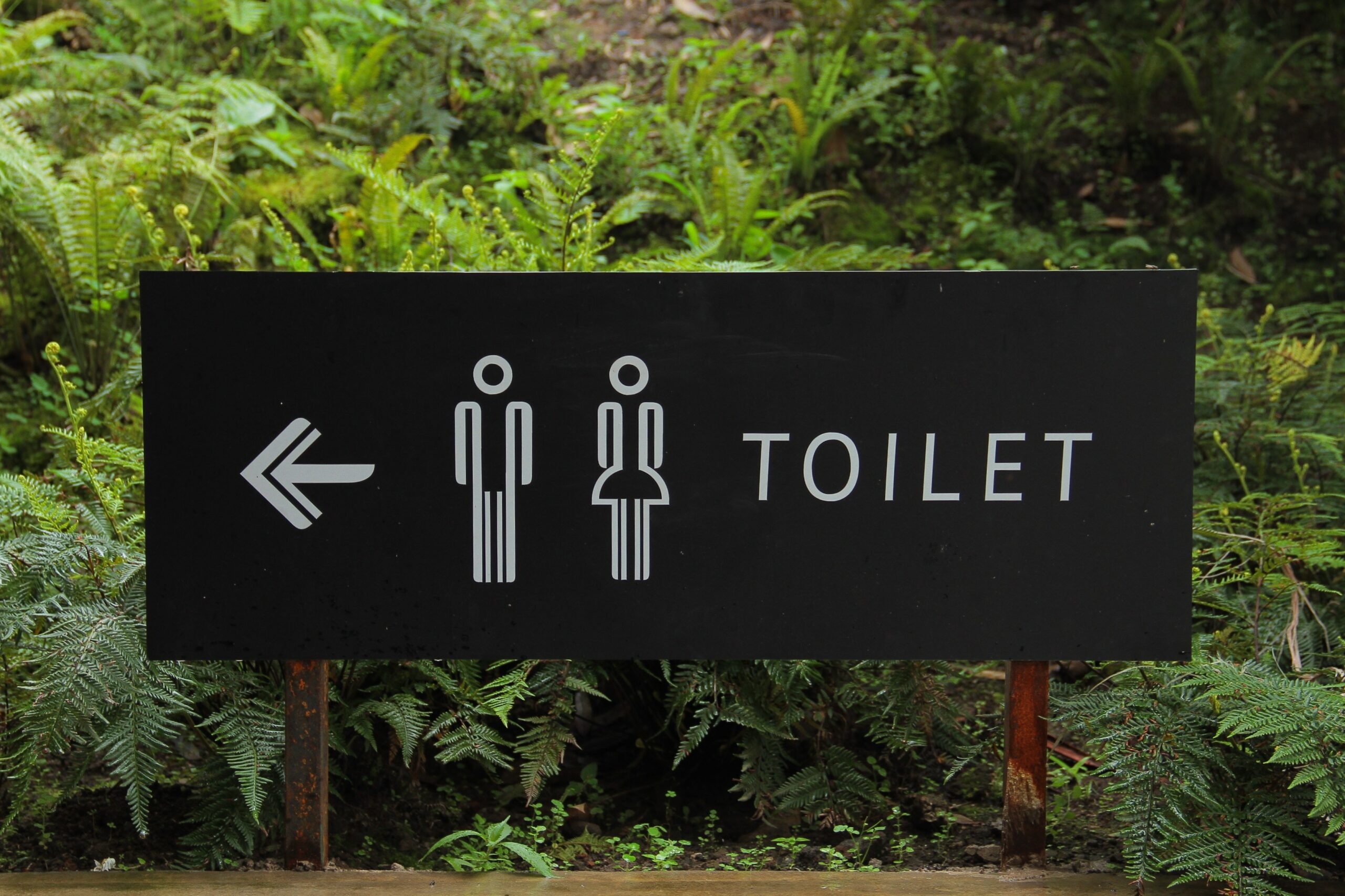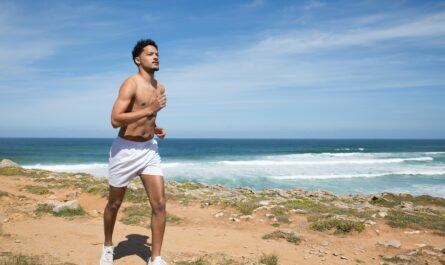Training for my first half-marathon race was mentally and physically quite challenging. But the most nerve-racking part of it all was the toilet stress that came with it. During almost every longer run I needed to go for a “number two”. I kept asking myself “Why always while running? Is there a solution for this unpleasant runners issue? Would it be possible to run the race without going to the bathroom?” I do not wish to spent precious race time in the queue at a port-a-potty and most importantly, because running makes me poop, I’d rather keep my pants clean!
So I did some online research and soon I found out that, thankfully, I was not the only one. Many runners around the globe suffer from toilet issues! Sometimes it happens after ten minutes, sometimes only after ten kilometres and sometimes not at all, but it does occur regularly: at some point your intestines decide to go in overdrive and you URGENTLY need to use a toilet. And I don’t mean as soon as you get home. I mean: NOW, IMMEDIATELY!

This might sound pretty funny, but I can assure you it is extremely annoying. After all, many running routes and forest trails are not equipped with a public toilet. There are a few options here: you continue the run uncomfortably with squeezed buttocks, you literally shit your pants, you go behind the bushes or you walk slowly until the cramps are over. In all cases, the focus on your running training is completely gone. All you can think of is where it would be possible to “release the pressure”. We are not alone in this. It happens to be the best among us, even professional marathon runners.
In this article I’ll share the information I found about possible causes, some solutions and practical tips for race days. Don’t worry: no unpleasant details will follow 😉
What causes urgent toilet needs during a run?
It’s hard to say as this is different to each individual. It is mostly a combination of factors that cause this “sudden toilet need”. During your training you will learn how your body responds to food, drinks, stress and other factors. It’s recommendable to keep a log to recognise your body’s “behaviour”.

PHYSICAL STRESS & BLOOD SUPPLY
While running your stomach and intestines are pushed and pulled up and down, the body temperature rises, you get dehydrated and the blood supply to your digestive tract is disrupted because your muscles need more. All together this makes your bowels move faster.
FOOD & DRINKS
Everything you eat and drink influences your bowels. What you had the day before will impact your bathroom situation before or during a run. Fatty meals, spicy food and fiber rich foods can all contribute to the need-to-go-to-the-bathroom during a run. The type of drinks before running can also cause issues. Hot drinks and caffeine can make you go to the bathroom faster. However, dehydration can cause bowel problems as well. While running, you lose a lot of body fluids due to sweating, especially if you’re running in hot weather conditions. Finally, there’s alcoholic beverages. It is the alcohol itself (combined with the dehydration it causes) that will send you to a bathroom on your next run.
NERVOUSNESS
On top of this you might sense some tensions before the race. That can also cause stomach or intestine issues.
How to reduce the “bathroom urgency” during a run?
While there is not one answer to why we encounter the issue, fortunately there are several tips to help reduce the chances of having to go to the bathroom while running. Some causes are more common and easily solved than others.
- Improve your running form: It takes an average runner approximately 1,000 strides to cover one mile. That equals a lot of intestinal pushing & pulling. You are literally shaking your bowels down. A way to decrease this “intestines massage” is to minimise your vertical movement while running. In other words minimise how much your body bounces up and down with every stride. On your next run, try not to come up higher than one inch with each stride.
- Go to the toilet before a run: Schedule your runs so you know what time you’ll leave the house. If you are a morning runner, try to get up earlier. This ensures that your body has time to fully wake up. You’ll have time to eat and drink and… go to the toilet before the run. Eat as early as you can, but at least 1 hour before running and drink water up to 30 to 45 minutes before a run. This will give you time to process and eliminate your intakes before your workout.

- Keep a nutrition & toilet usage log: We are all different in how we react to our intakes. Interrupting a training for a toilet visit is not such a big drama, but you do not want to experience it at a running event. Keep a log of what kind of food and drinks you have every day and in which amounts. And also how these correlate with your toilet visits. This can help you identify products or ingredients that may cause you to go into the bushes during a run and you can systematically start taking them out of your diet or eating them only on non-running days. For some runners it is fatty food to avoid, whilst others need to cut down on sugary or fibre rich items. Figuring out which foods are triggering your bowels is not easy. It can take the body approximately 12 to 24 hours to process the foods you had, so it’s not always clear which item you ate was causing the problem. But your log might give you a better insight to what you should not eat the day(s) before your run.
- Eat well: A balanced and healthy daily diet is important to every athlete. The body needs to be refuelled after burning energy during each run. For example proteins are essential for muscle recovery and fats and fibres are important to keep our bathroom habits regular. At about one to two days before a race though, it is recommendable to adjust your daily diet a little. Fats and fibres, combined with pre-race nerves and a long run, could contribute to diarrhoea. In those few days before the race you’d better cut out any rich, fatty foods, such as creamy sauces and fried products. Also switch from complex to simple carbs and try to avoid cruciferous vegetables such as broccoli or cauliflower on the day before a long run, as these often causes trouble.

- Make sure that you don’t have any more food than absolutely necessary sticking around in your stomach and intestines when you cross the start line of your race. It is also better to take your time for your meals and drinks: Sip and nibble as this allows your stomach to gradually absorb your intakes. Nutrients will be processed more efficiently and this minimises stomach cramps.
- Drink well: Regular fluid intake is important to stay hydrated. The best choice is to drink water at room temperature regularly during the day. Fill two bottles of water and make sure you take them with you wherever you go and have them finished by the end of the day. On your runs you could take a water supply in a camel back (water back pack) or running belt. You can find many brands and types in most of the (online) sport stores. Other option is to find out on forehand where the drinking water taps are located along your running track.

- Be careful with caffeine: While the stimulating compound in caffeine can improve the athletic performance (that’s why many running gels contain caffeine), it also gets the digestive system going. Some use a cup of strong coffee or tea on purpose, to make them go to the bathroom before the run. Others avoid coffee and tea because to them the caffeine effect is not fast enough and they want to avoid it makes them go to the toilet during the run. The amount of caffeine each stomach can tolerate is unique. Try to figure out what works best for you.
- Plan your route and know where the toilets are located: This way you can get there quickly if necessary. Ideally you should have a good healthy bowel movement a few hours prior to your long run or race. Try to schedule a pre-race toilet trip, if you can.
- Anti-diarrhoea prophylactic: You could also consider taking an anti-diarrhoea medicine just before (or on) the race day as this slows your bowel movement. Although this is really an emergency solution and not always recommended. Please always consult a doctor before taking any medications. Better not try them out for the first time on the morning of your marathon. Try taking them on a long run training session first and see how your body reacts. Experimenting with the amount and timing of medication during your training sessions will help you figure out what works for you. Usually one dose at the evening before a race and/or 1 dose (or even half a dose) when you wake up will be enough to allow yup to run the race without a “Number 2 emergency stop”.
- Control your nerves: The brain and gut are connected to each other, and stress or nerves can contribute to a change in your toilet routines. Some adrenaline can be very helpful during a race, but too much of it can make you go more often to the toilet. Eliminate all negative thoughts that make you extra nervous. You have been training, you are prepared, remember why you are running! It also helps to calm you down if you make sure you’re organised on where you need to be at what time: print the event information. And prepare your luggage. At least a day (or two) before race day put together everything you need for the race: shoes, clothing, running belt, water bottles, gels, watch. Or make a checklist! This all can help eliminate excessive stress.
- Tissues or wet wipes: Carry some tissues or wet wipes in a small plastic bag in your pocket or running belt for emergency needs. If there is no other option left, just go into the bushes!
Tips for race day
For runners who suffer from having to go to the bathroom during a run, the race day can feel extra challenging. You’re already nervous about the race itself and now the fear of possibly having to use the restroom adds some stress (which actually increases the need to use the restroom). It’s a viscous circle that no runner wants. Here are some race day tips in addition to the ones above:

- Arriving early to the race site is key as the lines for bathrooms. As they can get very long just before the race starts.
- Use the bathroom when you arrive to the race site, do your pre-race warm up and then use the bathroom one last time just before the race starts. By following the same routine throughout your training, you will teach your body to adapt to this process and time frame.
- Most running events provide a course map ahead of time and they usually mark the toilets as well. Knowing you have the option to use a bathroom along the course helps relieve the stress and worrying about it when and where you might need to go. Usually, the worst waiting queues occur at the toilets at the start, so you shouldn’t have to wait to use a port-a-potty along the course.
My personal experiences
Prior to my first half-marathon I was stressing out so much about my “toilet needs during running”. Weeks before the race I contacted the organisation about where the port-a-potties would be located. On their route map they marked the First Aid and the drinking stations, but they hadn’t marked the toilets yet. Once I found out there would be only port-a-potties at the start, halfway the course and at the finish line, my stress increased as I knew that my toilet needs were usually at different mileages. Almost all of my training sessions had been interrupted by a toilet visit. I really needed to find a solution for this issue. Believe me: I have tried all the tips described above! I tried to drink strong coffee just after waking up, hoping it would make me go to the toilet before my run, but this didn’t help. And I also tried to skip any breakfast coffee, but that didn’t change much either. Skipping breakfast meals made me dizzy during the run and waking up earlier than I already did (in order to have my breakfast earlier) didn’t really match with my family life. So I just had to deal with the fact that running makes me poop. I even tried adult diapers and pads. I can tell you, those things get extremely heavy when full of sweat! So they were not an option either.
What did help me, was a change of diet: cutting down on fibre rich foods and zero alcohol on the days before a long run did help a bit. But up until now I have never felt 100% sure I could do a long run without a toilet break. Prior to my half-marathon event I took half a dose of Imodium (anti-diarrhoea medication) at breakfast. Still, I carried some paper tissues in a plastic bag in my Flipbelt (running belt), for unforeseen emergency needs. But luckily I could finish this running event without toilet interruption!
Sh*t happens!

Yes, unfortunately running makes me poop! But luckily I’m not the only one and there are some things to tackle this problem. I keep reminding myself: Toilet accidents do happen to the best runners in the world! Just stop, let go and keep on smiling and continue. In the end: it’s much more fun 2 run with a smile on your face!
I hope this article was useful for you. Let me know if you have any questions. In case you have any additional solutions that work for you, please share them with us in the comments below or sent me a private message at an*******@mo*********.com. I will get back to you.






A very informative article!! I have to admit that happens to me when I get out and go walking or cycling. It is always frustrating and no it doesn’t always wait till you get somewhere. I also found humor from it. Not something I would of thought about writing about and researching but now that you have I learned somethings I needed to know.
Thanks for this brave, but yet informative article!
Thank you!
Im not sure you received the first comment. This is very informative and yes I found humor.. Took come guts to write an article about toilet habits and poop issues. I understand I find myself having the same problem when I go walking or cycling. Thanks for bringing up this issue!!! I like the images and all. Great job
thank you Amy!
Hi Angelique,
I love that you had the courage to write about such a private matter that really does affect such a large number of people. You have some great ideas to consider if gearing up for a marathon. I can really empathize for some that this worry can become so stressful that it takes away the enjoyment of the event.
Preparing ahead of time is a great plan.
Great article.
Thank you Tracy!
Great post & great tips! I’ve noticed this issue when my husband goes for runs at night- he does a mile warm-up and then swings by the house to use the bathroom before heading back out again to run another couple of miles. When he does a race he carefully plans his meals beforehand.
Humans aren’t the only ones with this issue- I take my dogs on a jog almost every morning. Without fail they stop halfway through our jog to use the bathroom- the reason my morning workout outfit ALWAYS includes plastic bags to clean up the mess.
Thanks again!
Whahaha, dogs too! Thanks for your comment!
Hello Angelique,
Haha – you solved my problem! 🙂
I never knew what to do in such a situation – now I do!
Thank you so much! 🙂
All the best,
George